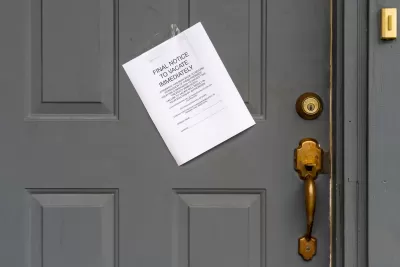Federal data reveals that millions of Americans could have faced eviction without emergency housing aid distributed during the pandemic.

An analysis of government data by Bloomberg News shows that federal emergency housing assistance distributed as a result of the Covid-19 pandemic prevented millions of Americans from being evicted, reports Jennah Haque in Bloomberg Politics.
The data comes at a particularly meaningful time as housing advocates urge the Biden administration to continue tenant assistance programs, pointing to a continuing rise in rent costs and an uncertain economic future. However, “That will be hard under legislation signed into law last weekend that suspended the nation’s borrowing limit as it clawed back unused pandemic aid and imposed caps on future increases in the federal budget,” Haque notes.
“Data on evictions is hard to come by, said Peter Hepburn, associate director of the Eviction Lab. There are more than 3,000 independently operated county courts which handle evictions, many of which often keep documents sealed, undigitized or both.” But “The lab credits the pandemic measures for preventing at least 800,000 evictions in 31 US metropolitan areas it studied.” According to U.S. Census Bureau data, 4.7 million more people reported being caught up on rent payments in the first quarter of 2023 than before the Emergency Rental Assistance Program was created.
FULL STORY: Pandemic Aid Saved Millions of Americans From Eviction and the Data Proves It

Maui's Vacation Rental Debate Turns Ugly
Verbal attacks, misinformation campaigns and fistfights plague a high-stakes debate to convert thousands of vacation rentals into long-term housing.

Planetizen Federal Action Tracker
A weekly monitor of how Trump’s orders and actions are impacting planners and planning in America.

In Urban Planning, AI Prompting Could be the New Design Thinking
Creativity has long been key to great urban design. What if we see AI as our new creative partner?

Florida Seniors Face Rising Homelessness Risk
High housing costs are pushing more seniors, many of them on a fixed income, into homelessness.

Massachusetts Budget Helps Close MBTA Budget Gap
The budget signed by Gov. Maura Healey includes $470 million in MBTA funding for the next fiscal year.

Milwaukee Launches Vision Zero Plan
Seven years after the city signed its Complete Streets Policy, the city is doubling down on its efforts to eliminate traffic deaths.
Urban Design for Planners 1: Software Tools
This six-course series explores essential urban design concepts using open source software and equips planners with the tools they need to participate fully in the urban design process.
Planning for Universal Design
Learn the tools for implementing Universal Design in planning regulations.
Gallatin County Department of Planning & Community Development
Heyer Gruel & Associates PA
JM Goldson LLC
City of Camden Redevelopment Agency
City of Astoria
Transportation Research & Education Center (TREC) at Portland State University
Jefferson Parish Government
Camden Redevelopment Agency
City of Claremont





























